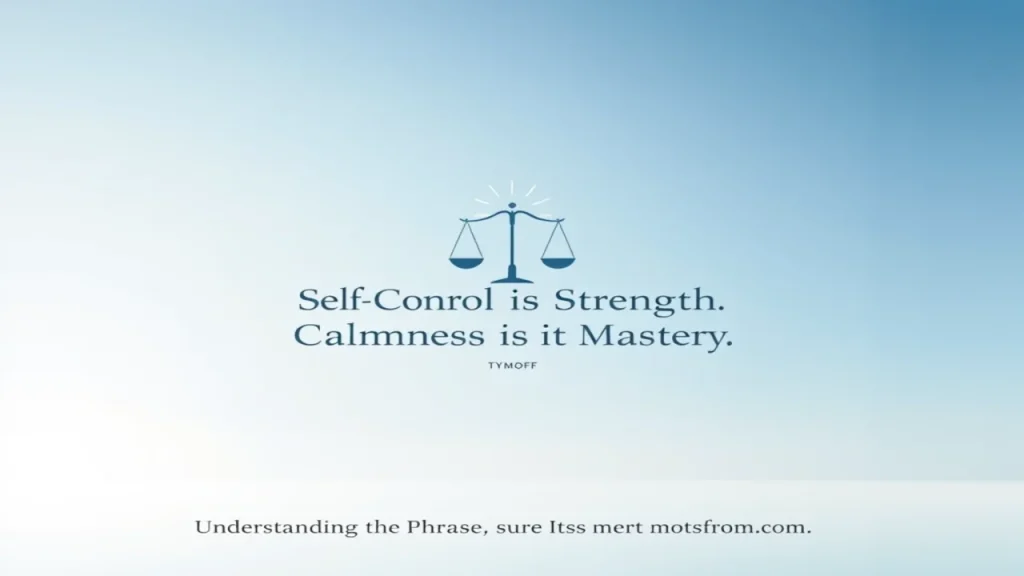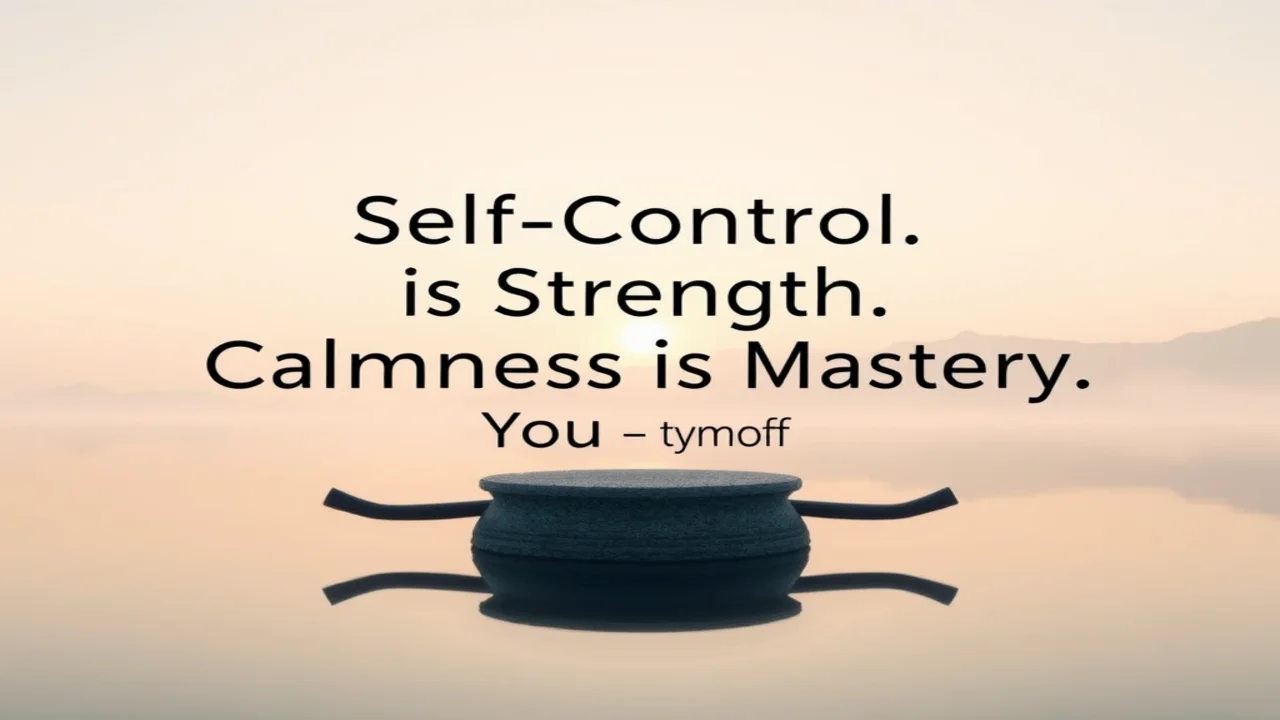Self-Control is Strength. Calmness is Mastery. You – Tymoff: All you need to know
Introduction
Quietness and self-restraint are undervalued in today’s high-pressure, fast-paced world. To succeed in life and find contentment within, they are essential, though. Self-Control is Strength. Calmness is Mastery. You – Tymoff perfectly encapsulates this philosophy. The enduring wisdom that “You – Tymoff” embodies is the importance of controlling one’s emotions and maintaining mental discipline. By providing a framework for thoughtful decision-making and a defined route to mastery, these principles not only encourage resilience but also equip people to flourish in any environment.
Understanding the Phrase and Its Origins

The ability to restrain oneself is a sign of tremendous strength. The philosophy behind the inspirational quote “Calmness is mastery.” has its origins in the teachings of great thinkers such as James Allen and the Stoics, who lived hundreds of years ago. These ideas highlight the significance of emotional intelligence and mental toughness, which are foundational to self-mastery. People are curious about the phrase because of the name “Tymoff,” but no one knows where the term came from. The profound significance of the statement is further enhanced by its blend of wisdom and mystery.
The Power of Self-Control
What Self-Control Truly Means
Having self-control means being able to keep one’s emotions, actions, and impulses in check so that one can achieve their long-term objectives. Refraining from acting rashly and instead relying on one’s ability to think things through is a hallmark of this virtue.
Why Self-Control is a Strength
The ability to resist temptation and redirect one’s attention when faced with a challenging situation is a hallmark of self-control. As a result, they are able to channel their efforts where they will have the most impact, making steady strides toward their goals in life.
Self-Control and Emotional Regulation
One of the most important aspects of self-control is emotional regulation. People are better able to communicate, form stronger relationships, and prevent needless conflicts when they can keep their cool when angry or frustrated.
The Science Behind Self-Control
Mindfulness and delayed gratification are two intentional practices that can help develop self-control, which is a finite resource according to psychological research. The formation of these routines reinforces connections in the brain, which in turn makes self-control easier.
Self-Control in Action
Constraint is frequently the difference between winning and losing, whether you’re an entrepreneur making tough decisions or an athlete getting ready for a high-stakes competition.
Calmness as Mastery
What It Means to Achieve Calmness
The capacity to keep one’s inner peace in the face of external turmoil is what we mean when we talk about calmness, not the absence of difficulties. It shows that you have mastered yourself and are emotionally intelligent.
The Role of Calmness in Decision-Making
Even under intense time constraints, a level head allows for more reasonable and clear decision-making. This level of calm is crucial for innovators and leaders to steer projects and teams to victory.
Stoicism and the Art of Calmness
The ancient Stoics taught that inner calmness is the source of all greatness. Achieving peace and purpose is possible when people concentrate on what they can change and accept what they cannot.
Techniques to Cultivate Calmness
Mindfulness training includes activities like meditation, deep breathing, and attentive observation. By making these practices habitual, you can improve your emotional stability and mental acuity over time.
The Ripple Effect of Calmness
When you keep your cool under pressure, people are more likely to put their faith in you, which benefits your relationships at work and in life. It improves health and well-being in general by lowering stress levels.
How These Principles Impact Daily Life
Building Resilience Through Self-Control and Calmness
Possessing both self-restraint and composure empowers people to gracefully and powerfully confront life’s obstacles. People are able to adapt and succeed because of resilience, which is a result of this synergy.
Enhancing Productivity and Focus
Minimizing distractions and maximizing task efficiency are both achieved through the practice of self-control. Consistent productivity is ensured by maintaining a calm and collected state of mind, which complements this.
Strengthening Relationships
In order to keep relationships healthy, self-control is essential, as is maintaining composure, which allows for more understanding and compassionate exchanges of ideas. These characteristics, when combined, foster closer bonds.
Health Benefits of Emotional Mastery
Reducing stress, lowering blood pressure, and improving mental health are all benefits of emotional regulation, according to research. A well-rounded and healthy lifestyle can be fostered by honing these traits.
Achieving Long-Term Goals
Achieving success takes time and effort. Being calm gives you the clarity to navigate the complexities along the way, and self-control makes sure you consistently put in effort.
What Does ‘You – Tymoff’ Imply?
The word “You” is a strong reminder that you are the driving force behind developing these traits. The message is very introspective and encourages a dedication to bettering oneself; it is therefore very personal. The name “Tymoff” may represent how the message transcends time and space, appealing to people of all backgrounds and cultures.
FAQs
What does “self-control is strength, calmness is mastery” mean?
This phrase emphasizes that true strength lies in controlling one’s emotions and impulses, while mastery over life stems from remaining calm under pressure.
How can self-control be developed?
Through practices like mindfulness, goal-setting, and delayed gratification, individuals can strengthen their self-control over time.
Why is calmness important in stressful situations?
Calmness allows for clear thinking and effective problem-solving, minimizing rash decisions and emotional outbursts.
What are the benefits of self-mastery in daily life?
Self-mastery improves decision-making, strengthens relationships, enhances productivity, and promotes physical and mental well-being.
How does Stoicism relate to these principles?
Stoicism teaches the importance of self-control and acceptance, aligning closely with the idea that calmness and inner strength lead to personal mastery.
Read More: Kennedy Funding Lawsuit: Inc. v. Greenwich Landing,Inc. v. Lion’s Gate Development,LLC
Conclusion
“The ability to restrain oneself is a sign of tremendous strength. A call to self-improvement, ‘Self-Control is Strength. Calmness is Mastery. You – Tymoff,’ is more than just a phrase. Achieving one’s goals, overcoming obstacles, and living a life of fulfillment are all possible when one adheres to these principles. Starting with self-reflection and progressing through purposeful practice, the path leads to benefits that permeate all parts of life and have an impact well beyond the individual.”







